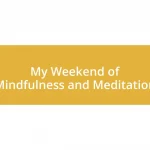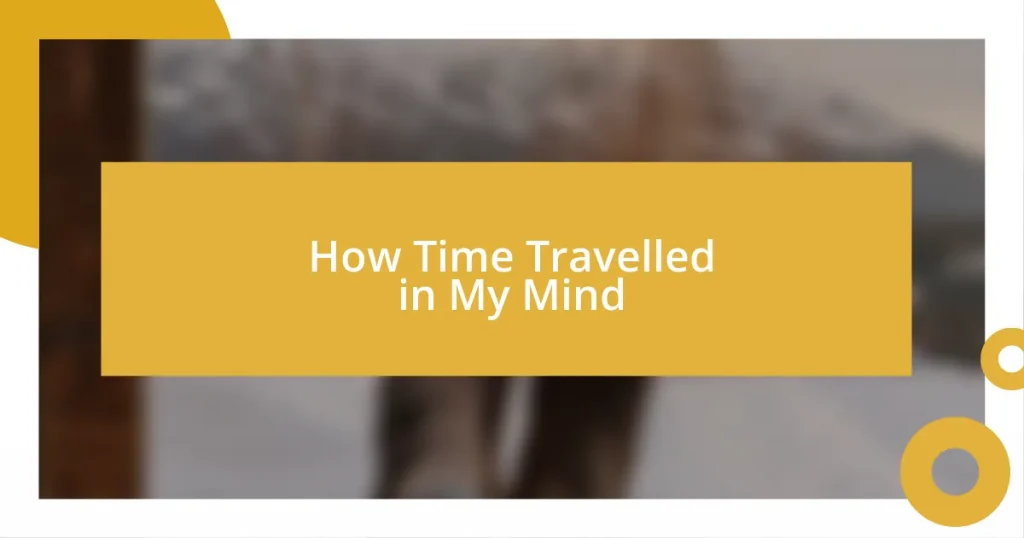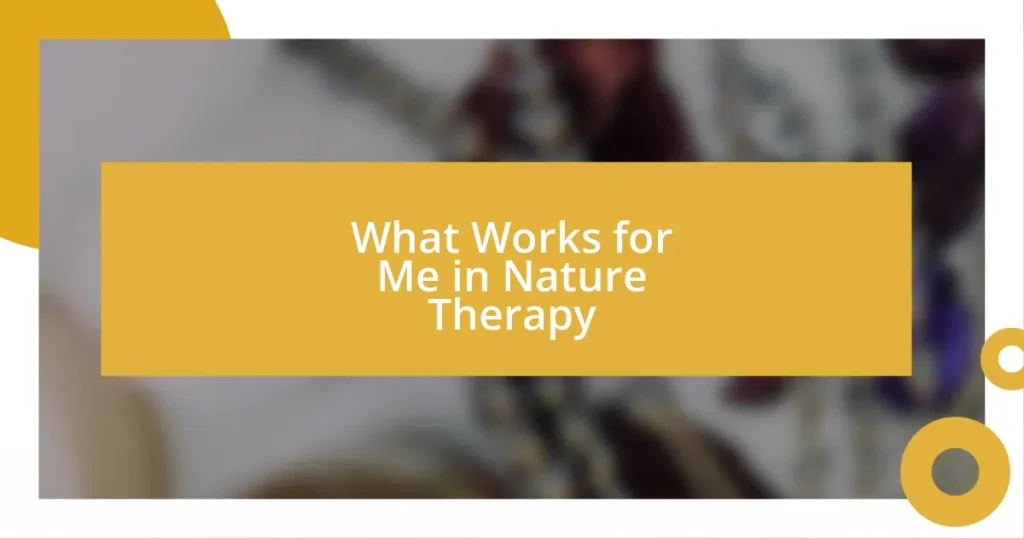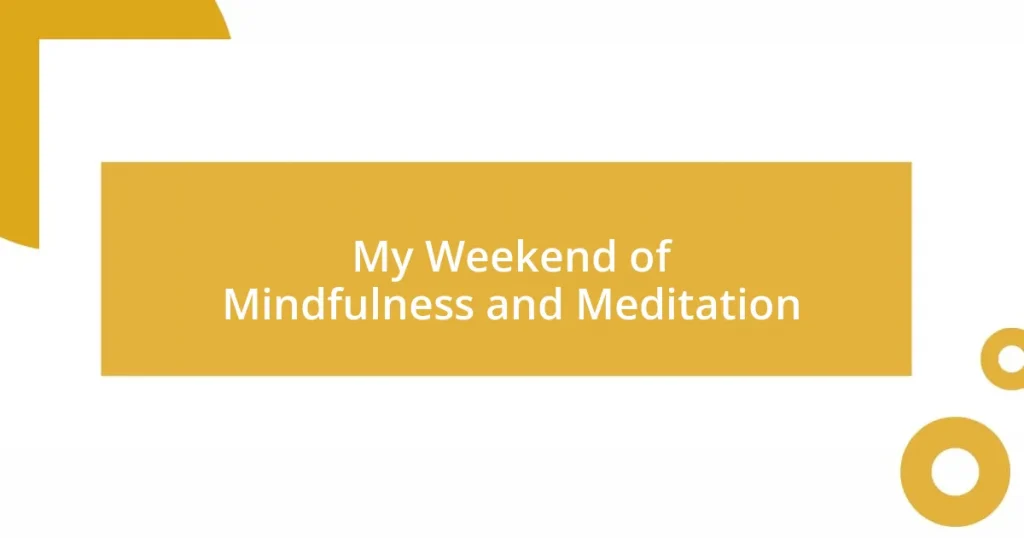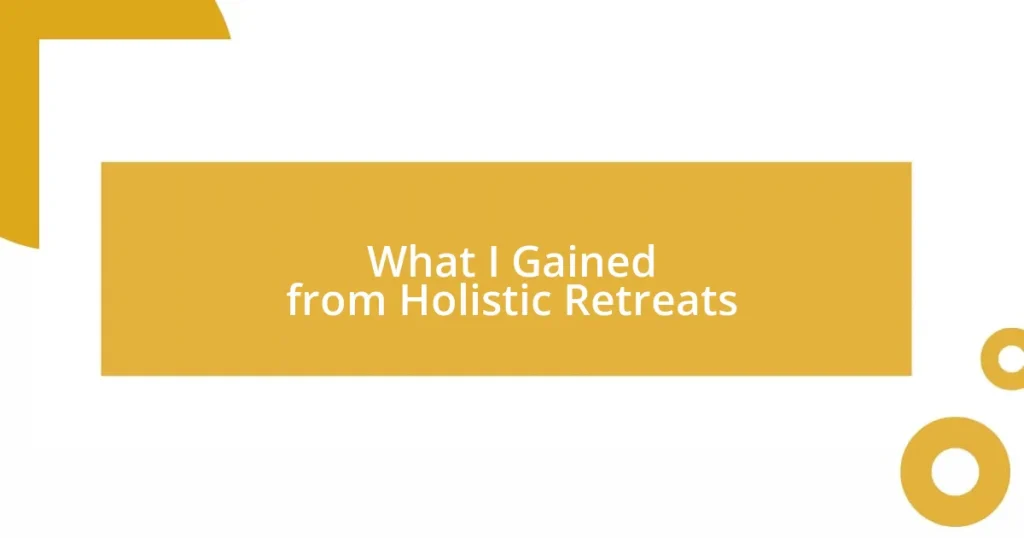Key takeaways:
- Time perception is highly subjective and influenced by emotions, experiences, and memories, causing similar durations to feel vastly different.
- Practicing mindfulness can enhance time awareness, creating a fuller experience of the present and transforming mundane activities into meaningful moments.
- Engaging in creative activities, breaking routines, and having deep conversations can alter time perception, expanding one’s experience of time.
- Visualization of past and future experiences can shape our understanding of time and motivate present actions towards achieving personal goals.
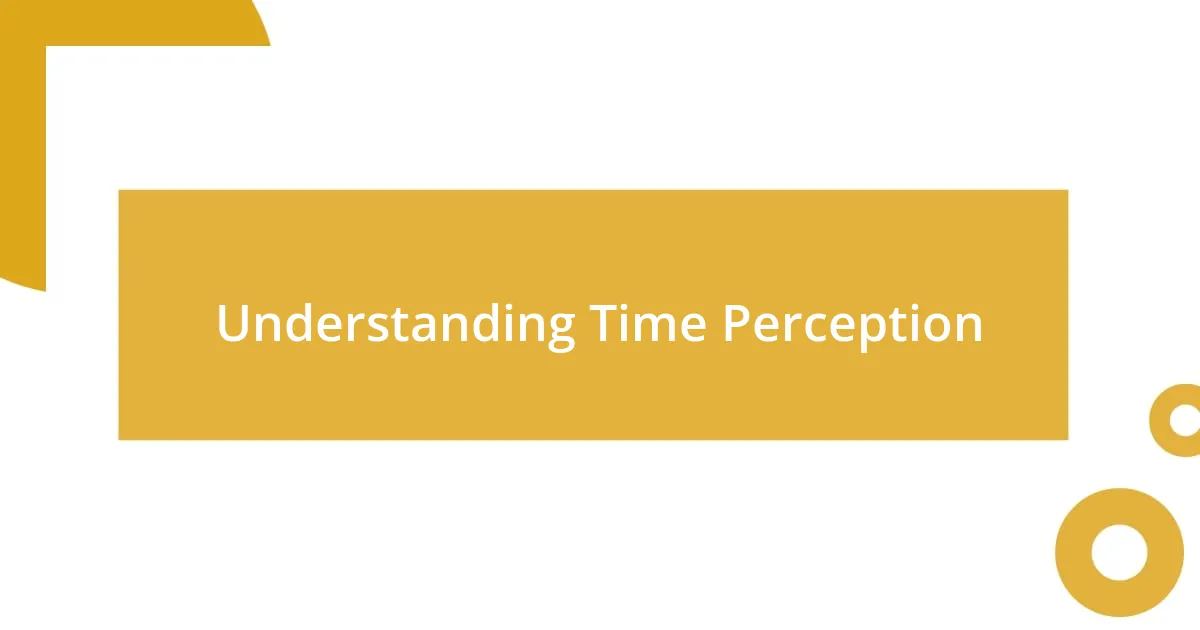
Understanding Time Perception
Time perception is a fascinating and incredibly subjective experience. I remember a weekend where hours felt like mere minutes during an engaging conversation with a friend. How strange it is that we can be lost in joy yet feel the weight of every tick when we’re anxious or waiting for something?
Our brains process time in ways that can drastically change our experiences of it. For instance, during a particularly challenging moment in my life, time seemed to stretch infinitely, each second dragging by as I waited for a resolution. Isn’t it curious that the same number of minutes can feel so different based on what we’re experiencing?
Moreover, our memories play a pivotal role in how we perceive time. I once found myself reminiscing about a summer filled with adventures that felt like a lifetime crammed into just a few sun-soaked months. Have you ever looked back and wondered how a brief moment in time could leave such a lasting impression? This interplay between memory and time is what makes our perception so uniquely personal.
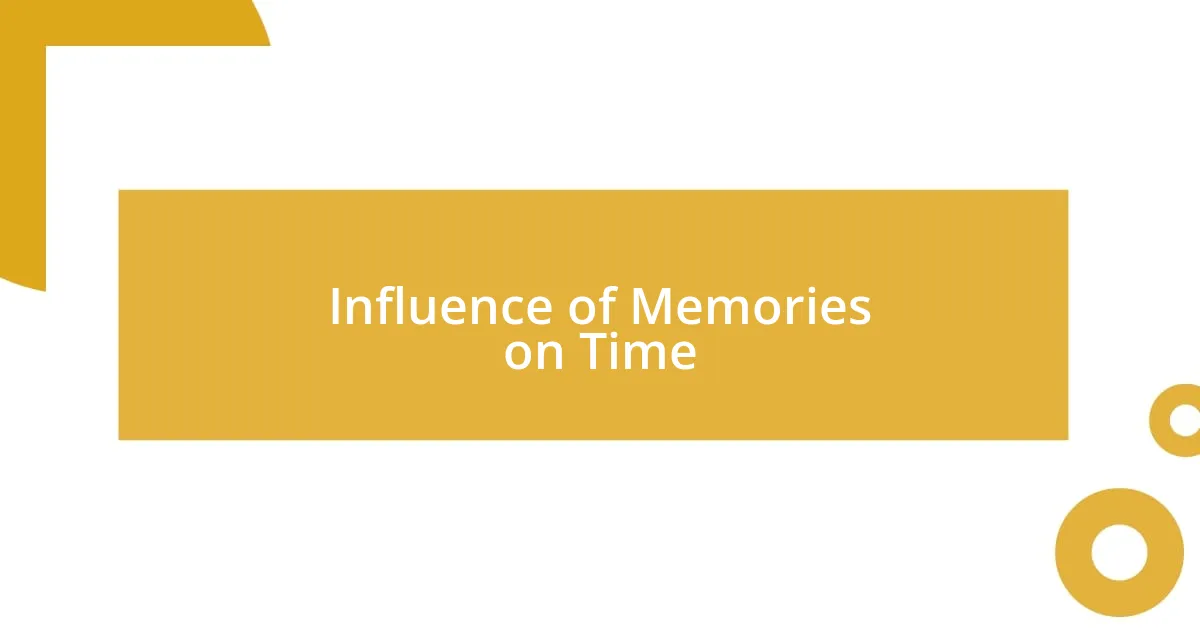
Influence of Memories on Time
It’s interesting how memories can warp our perception of time. I recall a rainy afternoon spent flipping through old photo albums. Each picture transported me back to moments I hadn’t thought about in years—birthdays, travel adventures, and laughter-filled gatherings. Suddenly, those seemingly fleeting events felt as if they’d spanned an eternity, blurring the lines between past and present.
- Nostalgic memories can create a sense of longing, making time feel slower as we savor those moments.
- In contrast, traumatic memories often feel compressed, leaving an impression of time racing by as we process the distress.
- Time spent in meaningful experiences tends to linger in our minds, while mundane moments can slip away, highlighting the value of being present.
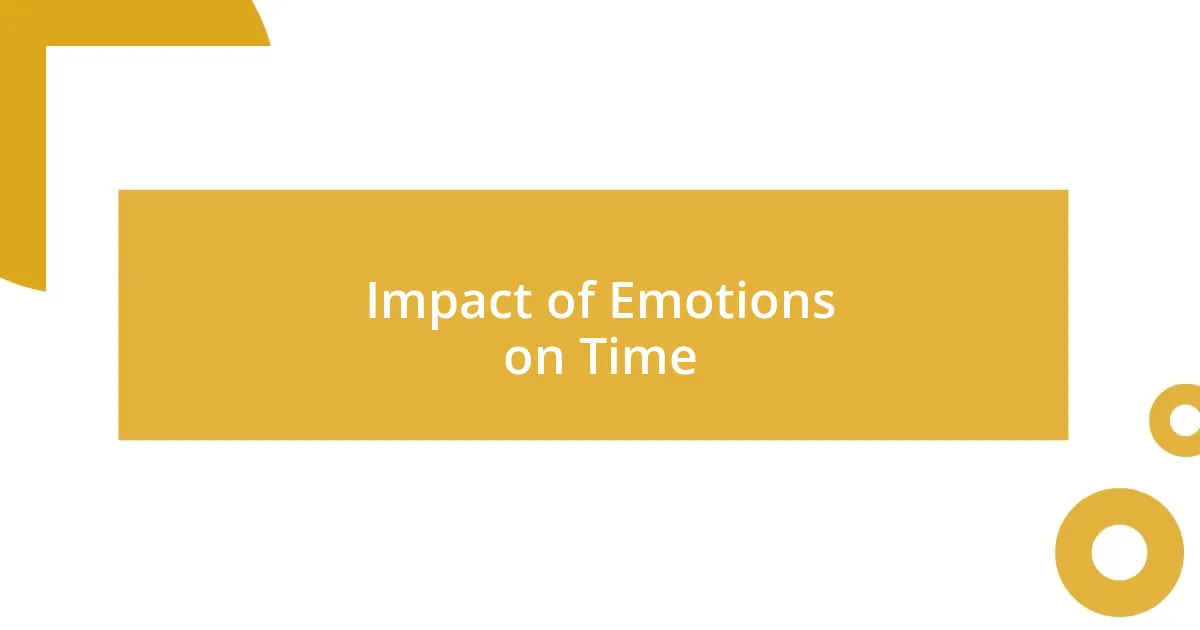
Impact of Emotions on Time
It’s incredible how emotions can influence our perception of time. For instance, during a moment of bliss, I often lose myself in joyful experiences, and suddenly, hours have disappeared. Have you ever noticed how laughter seems to stretch time? In contrast, when I find myself in the grips of anxiety, every tick of the clock feels agonizingly slow, as if time itself is prolonging my discomfort.
Emotions like fear and excitement can speed up or slow down our internal clocks. I distinctly remember the anticipation I felt before a big presentation; the days leading up to it felt like an eternity. Yet, strangely enough, the moment I stepped on stage zapped by in what felt like seconds. It’s fascinating how the same timeframe can feel completely different based on whether I’m eagerly awaiting an event or bracing myself for something daunting.
Similarly, when I reflect on moments riddled with sorrow, I sometimes find myself paralyzed in thought, lost in a time loop of grief. I recall being stuck in a fog after a personal loss, where an entire week blurred together in a haze. Emotions seem to create threads that weave through time, making some periods feel rich and full, while others seem to disappear entirely.
| Emotion Type | Effect on Time Perception |
|---|---|
| Joy | Time feels faster, moments are cherished |
| Anxiety | Time stretches, each tick becomes a weight |
| Nostalgia | Slower perception, savoring past moments |
| Trauma | Compressed time, racing thoughts |
| Sorrow | Time blurs, feels like paralysis |
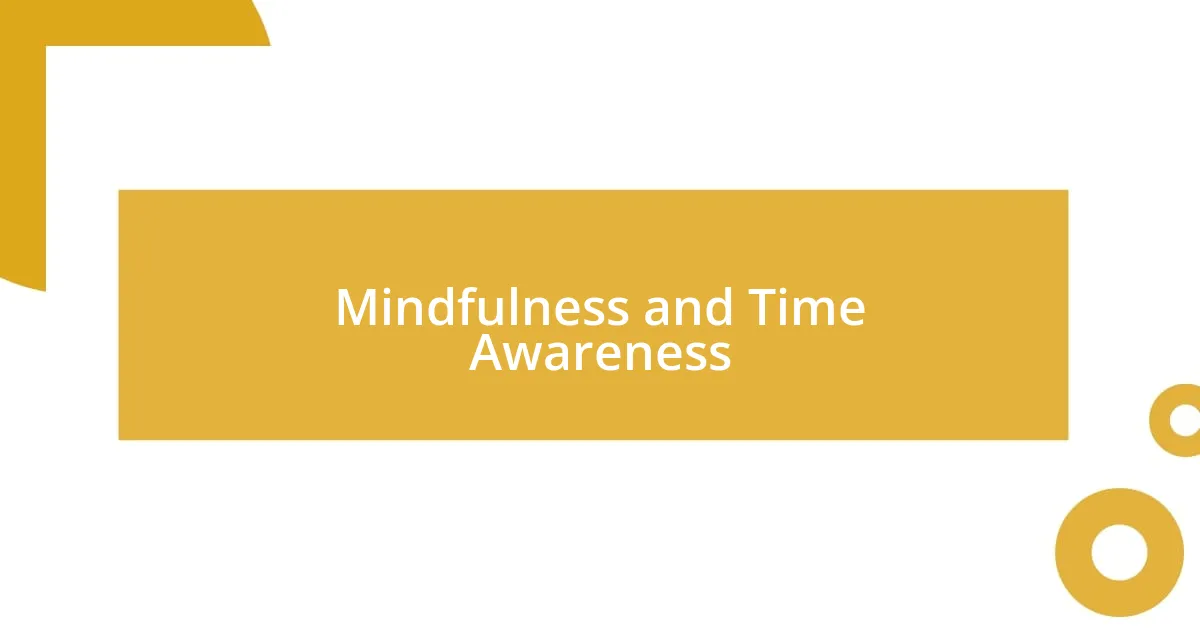
Mindfulness and Time Awareness
Mindfulness has a profound impact on how we perceive time. I remember sitting quietly in a garden, allowing my senses to awaken to the present moment. As I focused on the fluttering leaves and the warmth of the sun, time felt almost suspended. Have you ever experienced that magical sense of stillness? It’s as if the world around you fades, and you’re only aware of what’s right in front of you. In those moments, hours can feel like blissful minutes.
Practicing mindfulness encourages me to relish each passing second, creating a fuller experience of time. I often spend intentional moments observing my breath, and suddenly I notice how every inhale and exhale draws me deeper into a timeless space. This practice allows me to step back from the hustle and bustle and appreciate the richness of now. I ask myself, what if every day could be approached with this same attention?
It’s fascinating how mindfulness can transform mundane activities into extraordinary experiences. One evening, while washing dishes, I lost myself in the rhythm of the water splashing and the warmth of the sudsy foam. In that simple act, I felt connected to my surroundings, and time expanded, allowing me to savor the peacefulness that often escapes us in the rush of life. Mindfulness holds the key to reshaping our temporal perspective, enabling us to pause and appreciate life as it unfolds.
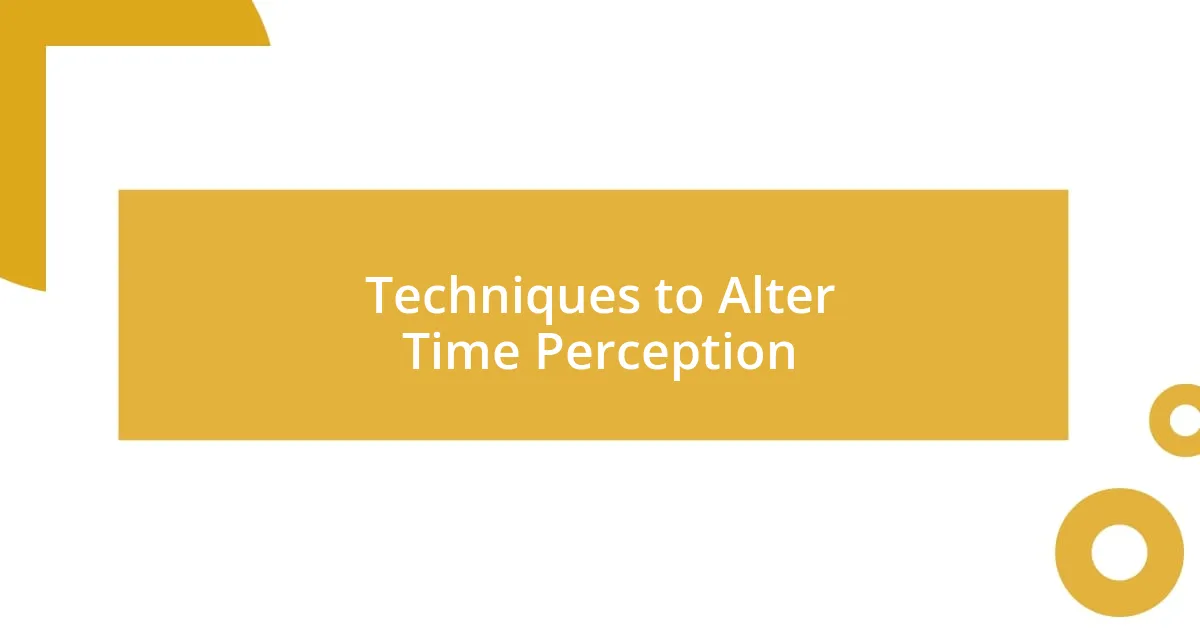
Techniques to Alter Time Perception
Engaging in creative activities can profoundly alter my perception of time. I recall a weekend spent painting with friends, completely immersed in the colors and strokes on the canvas. It felt like time evaporated; hours whisked by in an exhilarating blur as we lost ourselves in our imaginations. Have you ever felt that way while doing something you love? Losing track of time in the flow of creativity can leave a lasting impression, as moments of joy and concentration blend seamlessly.
Another technique I’ve found effective is breaking from routine. One day, I decided to take a new route during my daily walk. The unfamiliar sights and sounds sparked my curiosity, elongating my experience of that simple journey. I realized just how powerful a change in perspective can be. When was the last time you intentionally stepped out of your comfort zone? Embracing spontaneity invites time to expand, filling our lives with new memories and enriching the everyday.
Lastly, I’ve discovered that deep conversations can stretch time remarkably. I remember a late-night chat with a close friend over coffee; we talked for hours about life, dreams, and fears. It felt like time stood still as we connected on a deeper level. In those moments of vulnerability, I found that genuine connection can create an entirely new dimension of time. How many times have you found yourself lost in conversation, feeling as if the world around you faded? It’s amazing how the richness of human connection has this magical ability to transform time perception.
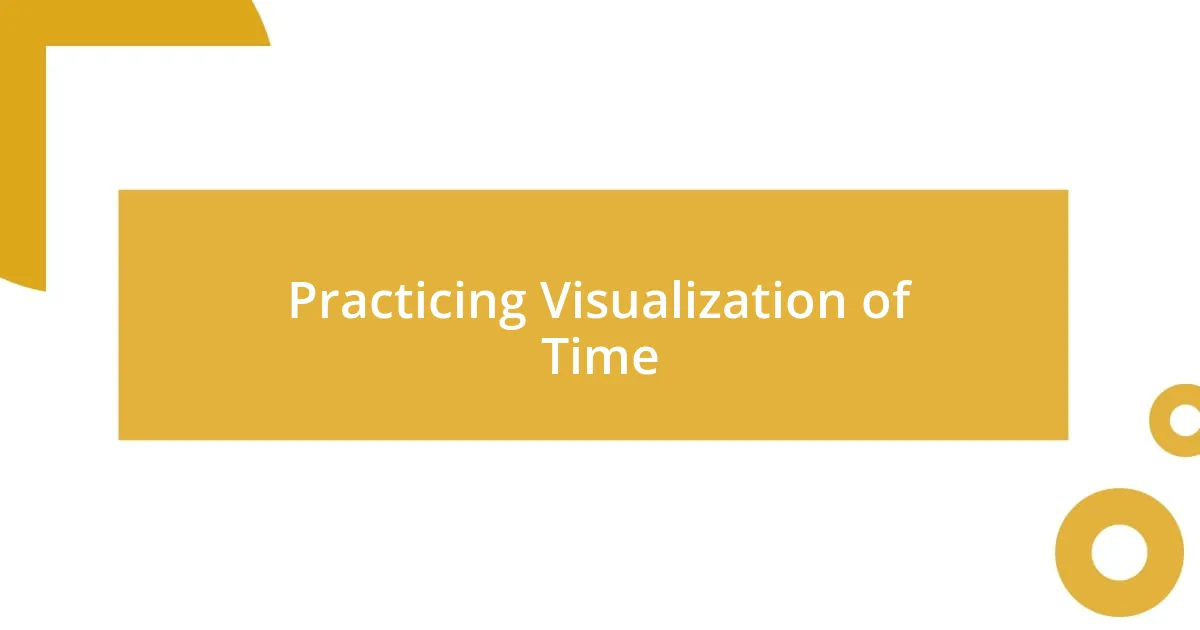
Practicing Visualization of Time
Visualization of time is a fascinating practice that can profoundly shape how we experience reality. I often imagine my past experiences as vibrant scenes on a movie reel, playing out in my mind. Sometimes I close my eyes and focus on a specific memory, almost as if I can step back into that moment, reliving emotions tied to it. Have you ever tried to picture a moment so vividly that it felt like time stood still? The powerful connection between memory and visualization truly intrigues me.
When I practice this visualization technique, I usually select a meaningful lesson or achievement from my life. Visualizing the steps I took to reach that point creates a sense of continuity, reminding me that my journey has been shaped by the past. One evening, while reflecting on my first day at a new job, I could almost hear the laughter of my colleagues and feel the excitement and anxiety bubbling within me. In those moments, I realize that time isn’t just a linear concept; it’s layered with experiences that influence who we are today.
There are times when I also visualize the future, imagining where I’d like to be in five or ten years. I envision the goals I want to achieve—whether traveling to new places or starting a project close to my heart. This practice helps clarify my intentions and motivates me to work towards them. Have you ever envisioned your future so clearly that it sparked a fire within you? For me, imagining those possibilities makes me feel more alive, anchoring my present choices to a broader timeline of my life.

